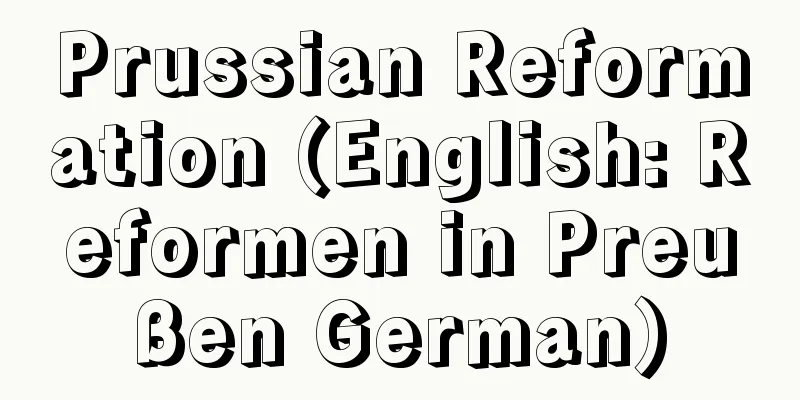Prussian Reformation (English: Reformen in Preußen German)

|
This refers to a series of reforms that took place in the Kingdom of Prussia from 1807 onwards, such as the Stein-Hardenberg reforms, the military reforms by Scharnhorst and others, and the education system reforms by Wilhelm von Humboldt. Prussia, which had been forced into a humiliating peace by Napoleon I, was in a national crisis and was forced to modernize its feudal social system and absolutist state system. In October 1807, Frederick William III entrusted Stein with leading national politics, and he issued the Edict of Emancipation of the Peasants (October Edict) and City Ordinances. He then attempted to reform the central government, but this was not realized as he resigned in November 1808 due to pressure from Napoleon I. The reform project was taken over by Hardenberg in June 1810. A series of industrial legislation was enacted and attempts were made to reform the central government, but the agricultural reform implemented under the Vienna system made significant concessions to the Junkers, restricting the number of peasants to be emancipated and leaving many feudal privileges in place, so agricultural modernization was carried out in the interest of the Junkers. Military reform was promoted by non-Junker military men such as Scharnhorst and Gneisenau. They aimed to create a national army with compulsory military service for all and to abolish the privileges of the nobility in the military, the former of which was achieved in 1814. However, the Junkers' monopoly over officers remained unshakable. Reforms of the education system were carried out under the leadership of Humboldt, and included the founding of the University of Berlin (1810) with the aim of promoting national spirit, the development of a primary education system based on the ideas of Pestalozzi, and the founding of a humanistic gymnasium with a focus on classical education. Although the Prussian Reforms contained many of the incompleteness that is associated with "reforms from above," they not only gave Prussia the strength to escape from the control of Napoleon I, but also marked the starting point for Prussia's development that would eventually lead to German unification. [Katsuyo Okazaki] [References] |Source: Shogakukan Encyclopedia Nipponica About Encyclopedia Nipponica Information | Legend |
|
1807年から行われたプロイセン王国の諸改革、すなわちシュタイン‐ハルデンベルクの改革、シャルンホルストらによる軍制改革、ウィルヘルム・フォン・フンボルトによる教育制度改革などの一連の改革をさす。 ナポレオン1世により屈辱的講和を強制されたプロイセンは、その国家的危機のなかで封建的社会制度と絶対主義的国家体制の近代化の必要に迫られた。1807年10月、フリードリヒ・ウィルヘルム3世によって国政指導をゆだねられたシュタインは、農民解放令(十月勅令)、都市条令等を発布。ついで中央政府機構改革に取り組むが、ナポレオン1世の圧力によって08年11月辞職したため、実現をみなかった。改革事業は、10年6月よりハルデンベルクによって引き継がれた。一連の工業関係立法が行われ、また中央政府の機構改革が試みられたが、ウィーン体制下で実施されていった農業改革では、ユンカーに大幅な譲歩をして、解放される農民を低く制限し多くの封建的特権を残したため、農業近代化はむしろユンカーの利益において遂行されることとなった。軍制改革は、シャルンホルスト、グナイゼナウなど非ユンカーの軍人によって推進された。彼らは、一般兵役義務制による国民軍の創出、軍における貴族特権の打破などを目ざし、前者は1814年に実現をみた。しかし、将校に対するユンカーの独占的地位は、結局揺るがなかった。教育制度改革はフンボルトを中心に進められ、国民精神発揚を目ざしたベルリン大学設立(1810)、ペスタロッチの思想にのっとった初等教育制度の整備、古典教育を柱とする人文ギムナジウム創設などが行われた。 プロイセン改革は「上からの改革」に伴う不徹底さを多く有しているが、しかしそれはナポレオン1世の支配から脱する力をプロイセンに与えただけではなく、やがてドイツ統一を達成するプロイセンの発展の出発点となった。 [岡崎勝世] [参照項目] |出典 小学館 日本大百科全書(ニッポニカ)日本大百科全書(ニッポニカ)について 情報 | 凡例 |
<<: Prussian constitutional dispute (English: Verfassungskonflikt) German
>>: Prussian General Land Law - Prussian General Land Law (English)
Recommend
Oldenborg Dynasty - Oldenborgske Linie
A Danish-Norwegian dynasty that lasted from 1448 t...
Temple status - Jikaku
〘Noun〙 The status of a temple. Such as monzeki, he...
Tobae
Kabuki dance. Kiyomoto. Lyrics by Sakurada Jisuke...
Yachiyo [town] - Yachiyo
A former town in Takada County, central Hiroshima ...
Maruyama [town] - Maruyama
An old town in Awa District, southern Chiba Prefec...
Qabusnama (English spelling)
…However, after he was assassinated by a Turkish ...
Proboscidea - Chobirui
A general term for animals belonging to the order...
Jacques Champion de Chambonnières
French harpsichordist and composer. He studied un...
Contraction ring
...If the birth canal fails to open or if the fet...
Renpei Kondo
Year of death: February 9, 1921 Year of birth: Nov...
Notice - Kokuji
An act of officially informing the public of matt...
Ogawa Tazaemon Book - Ogawa Tazaemon Book
...In 1658 (Manji 1), a book of Noh plays entitle...
Patrology
…the term is used to refer to the influential Chr...
Monument - Hiketsu
A type of carved stone that originated in China. ...
Gynura bicolor - Gynura bicolor
A perennial plant of the Asteraceae family, native...









